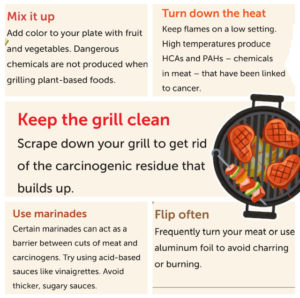Grilling 4 Better Health
Who doesn’t love a BBQ!?
The smell of the grill. The hiss of the flame. The fun of a backyard barbeque. Grilling is one of the great joys of summer! Delish! Am I right!?
We agree… that said, there are health considerations when eating a lot of grilled food.
Small amounts of grilled meat are likely just fine to consume, but for people with a history of cancer or for those who eat grilled food often, there are health considerations.
Meat (including beef, pork, sausage poultry) and fish, may form carcinogenic chemicals called heterocyclic amines (HCAs) and polycyclic aromatic hydrocarbons (PAHs) when charred or cooked over high heat, as on a grill. HCAs are formed when amino acids (the building blocks of proteins), sugars, and creatine or creatinine (substances found in muscle) react at high temperatures. PAHs are formed when fat and juices from meat grilled directly over a heated surface or open fire drip onto the surface or fire, causing flames and smoke. The smoke contains PAHs that then adhere to the surface of the meat. Research suggests that high exposure to meat carcinogens, particularly HCAs, may increase the risk of human cancer.
HCA formation is influenced by:
- Type of food
- How it’s cooked
- Temperature
- How long it’s cooked
PAH creation is influenced by:
- Temperature of cooking
- How long food is cooked
- Type of fuel used in heating
- Distance from heat source
- Fat content of the food
Grilling Foods 4 Better Health
There are ways to reduce exposure of HCAs and PAHs
-
- Clean the grill! The leftover char from that last cookout contains the chemicals we are trying to avoid – its best to clean the grill before cooking.
- Go Lean:
Instead of grilling fatty burgers or sausages, opt for lean, grass-fed steak, chicken, or fish. Further, removing the skin from poultry before cooking will reduce HCA formation.
- Avoid Charring & Trim Meat: Rotate meat frequently to allow the center to fully cook without overheating the surface. Remove any charred portions of meat, and refrain from using gravy made from meat drippings. Overcooking and prolonged exposure to high temperatures increases the amount of carcinogens in the meat.
- Avoiding direct exposure of meat to an open flame or a hot metal surface and avoiding prolonged cooking times (especially at high temperatures) can help reduce HCA and PAH formation. “Flamelicked” meats have higher HCAs and PAHs – Best to not let the flame make contact with the meat/fish.
 Use Marinades: Acidic rubs and marinades (especially acid-based marinades made with lemon, lime, vinegar or wine) may help break down some of the muscle in the meat an
Use Marinades: Acidic rubs and marinades (especially acid-based marinades made with lemon, lime, vinegar or wine) may help break down some of the muscle in the meat an
d reduce the number of HCAs on your plate (*as long as there isn’t a lot of sugar in the marinade*). In one study, a teriyaki marinade was able to lower HCA levels by 44-67 percent, whereas a honey BBQ sauce marinade increased HCA formation 1.9-2.9 times! This was likely due to the high sugar content and low phenolic and antioxidant content of the BBQ sauce. (Bonus tip: If you are going to use BBQ sauce, put it on at the end of cooking. That way it’s less likely to burn and char.)- Use Herbs and spices: They make food taste great and can help lower HCA and PAH content. Rosemary is the most researched herb. It can lower HCA formation by up to 90 percent in some cases. Other herbs from the mint family (of which rosemary is a part), all decrease HCA formation. This includes basil, thyme, sage and oregano. Turmeric is another helpful spice. A classic spice used in South and East Asian dishes (it’s what makes curry yellow), turmeric can decrease HCA formation by up to 40 percent. Onion powder has also been shown to reduce one of the major types of HCAs (PhlP) by up to 94 percent and fresh garlic, when used in marinades, can also decrease HCA formation by up to 70 percent.
- Add Veggies or grill them instead! Vegetables and fruits are not only tasty when grilled, they contain little to no cancer-causing chemicals. Pair veggies and fruit with some grilled meats and they can also help fight any potential HCA / PAH damage. These anti-oxidant, low glycemic, nutrient dense foods also help the liver to remove potential toxins from the body. In particular, Cruciferous-Vegetables (broccoli, cauliflower, cabbage, kale, broccoli rabe, brussel sprouts, arugula, etc.) are extra helpful.
All content is meant to Inspire, Empower and Educate our patients and the community. We would love for you to share this information as a way to support you and your loved ones 4 Better Health, Vitality and Longevity!


 “Finding 4 Better Health was a blessing after many years of traditional medicinal doctors /Endocrinologists being unable to get me to feeling optimal. Dr Zub listened to me, truly heard me & devised a proactive plan for me to have a better life. My body is still healing, but I am no longer barely functioning to get through my daily life. I can exercise again without being completely depleted of energy. I have been able to successfully lose 20 pounds. I feel I can always contact Dr. Zub with any questions or concerns I may have. We continue to work together to find the right course of action for my health. I can’t say enough great things about their practice.”
“Finding 4 Better Health was a blessing after many years of traditional medicinal doctors /Endocrinologists being unable to get me to feeling optimal. Dr Zub listened to me, truly heard me & devised a proactive plan for me to have a better life. My body is still healing, but I am no longer barely functioning to get through my daily life. I can exercise again without being completely depleted of energy. I have been able to successfully lose 20 pounds. I feel I can always contact Dr. Zub with any questions or concerns I may have. We continue to work together to find the right course of action for my health. I can’t say enough great things about their practice.”

